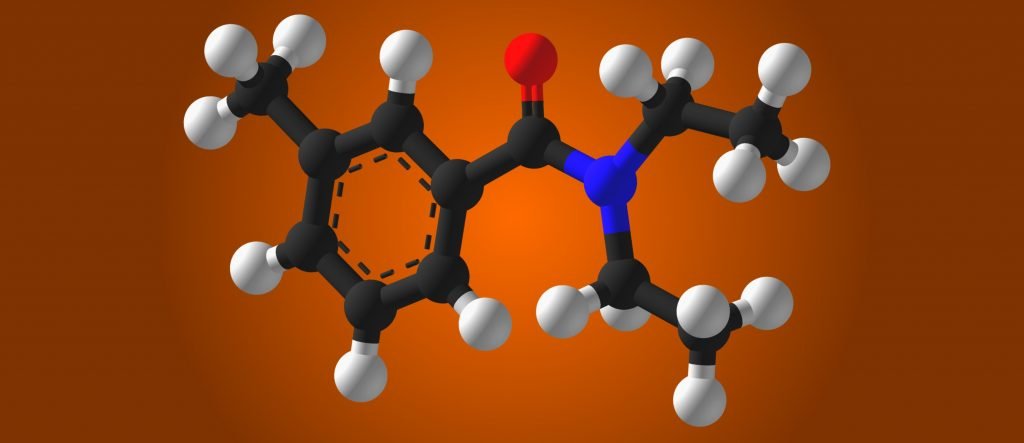Reference
Is DEET Really All That Bad?
No Mozzie uses PMD Rich Botanic Oil (also known as Oil of Lemon Eucalyptus, or the brand name Citriodiol and Citrepel) as an active ingredient and we’d much rather extol the virtues of PMDRBO than say negative things about DEET, but much of our motivation to look at alternatives originated from our experience of DEET so we thought we’d share our findings and let you decide.
DEET is a pesticide
DEET (diethyltoluamide) was invented in the 1940’s in the USA as an agricultural pesticide, and has been in use as an insect repellent since then – initially with the US military and then as a commercial product. It’s been around for a long while, and at a concentration of around 30% it is undoubtedly effective at deterring mosquito bites. Concentrations above 30% don’t offer any more protection – although they do increase the duration of that protection. So, even if you’re already happy with a DEET-based repellent we would recommend you don’t choose one with a concentration higher than 30% – many countries now ban DEET in concentrations above this.
DEET is a weedkiller
As well as being a pesticide, DEET has herbicide properties – it desiccates and kills plants. This doesn’t necessarily mean it’s evil – there are many completely benign substances that kill plants – but if you do use DEET, don’t spray it on your legs while standing next to valuable greenery (like the St Andrew’s 18th or a rare Costa Rican orchid)!
DEET is a solvent
DEET is also a carbon-based (hydrocarbon) solvent and dissolves many plastics. It will happily eat away at your watch, sunglasses, water bottle, camera and clothing!
DEET is in waterways
DEET survives water treatment and biodegradation. While we don’t have much data on how much DEET is present in our water supply in the UK, in the USA the CDC has found DEET as a contaminant in surface water, groundwater, and drinking water.
DEET is arguably toxic
Beyond Pesticides rates DEET as “toxic” citing Neurotoxicity, Kidney/Liver Damage and Birth/Developmental effects.
Conclusion
So at the very least, DEET is an agricultural pesticide, weedkiller and solvent. Not an ideal candidate for spraying on your skin. Despite DEET having been around for decades, we wanted to use a natural active ingredient for our formula that partnered well with our other repellent ingredients, and that didn’t have so many undeniable drawbacks as DEET so we are delighted with the performance of PMD Rich Botanic Oil.
References
DEET as a herbicide, DEET kills grass, DEET toxicity, DEET in waterways



